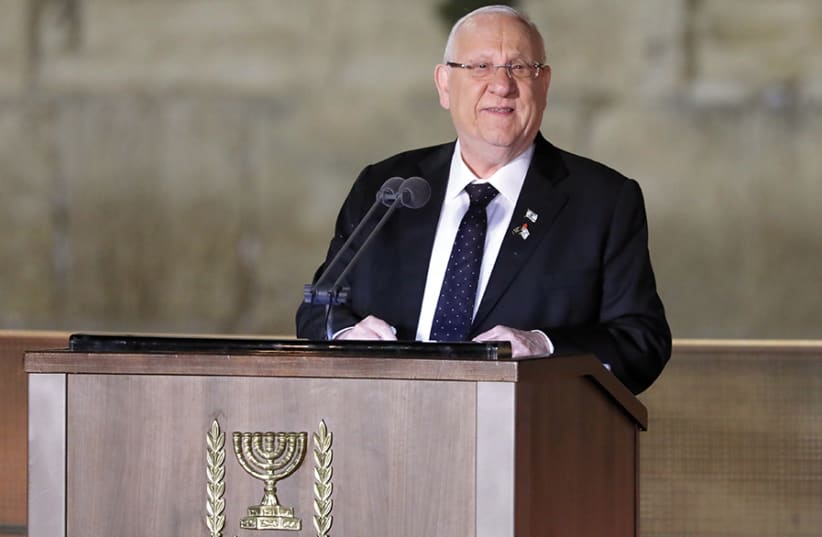With his mind on the possibility of a last-ditch miracle to save Israel from a third round of parliamentary elections in less than a one-year period, President Reuven Rivlin on Wednesday hosted a delegation of close to thirty ambassadors accredited to the United Nations.
Their visit was jointly organized by the American Zionist Movement comprising 33 national Jewish Zionist organizations, the International March of the Living and Israel’s permanent mission to the United Nations, which is headed by Danny Danon, who escorted the delegation.
Prior to coming to Israel, the ambassadors, some of whom were accompanied by their spouses, first went to Poland where they visited the Warsaw Ghetto and the Majdanek extermination camp. They also toured the Polin Museum, where they learned something of the thousand years of Jewish life in Poland.
This is the fourth such delegation to take the Poland-Israel tour. All in all, representatives of some 80 countries have participated.
While Rivlin welcomed them cordially – emphasizing the fact that they were in Jerusalem, the capital of Israel – he could not refrain from taking a jab at UNESCO, the cultural entity of the United Nations, for passing a resolution denying the rights of Israel and the Jewish people to Jerusalem, when there is so much historical evidence of the Jewish connection to the city.
He was also critical of UN bias against Israel in general, citing more than 20 resolutions against Israel that were adopted in 2018 by the UN General Assembly, while ignoring human rights violations by other countries in a region where Israel is the only democracy.
The president found this puzzling in view of UN Resolution 181, passed on November 29, 1947, calling for the partition of Palestine in order for there to be one Jewish state and one Arab state.
The Arabs had never accepted the creation of a Jewish state, he said, explaining that their objections went beyond nationalism and are also founded in religion.
On the other hand, Rivlin said, when the State of Israel was established, it was created not only as a Jewish state, but a Jewish and democratic state in which everyone could practice their own faith and traditions, and where all citizens could enjoy equal rights.
Israeli democracy is not intended solely for the Jews but for everyone, he insisted.
Insofar as bringing the Israeli-Palestinian conflict to an end, he admitted that neither side trusted the other, and therefore confidence building measures are sorely needed.
“In order to reach an understanding, we must build confidence,” he said. “We can sign a lot of peace agreements, but nothing will happen if we don’t build confidence.”
Despite the odds, and the long years of conflict, Rivlin believes that peace is possible, and asked the UN representatives to help in building up confidence between Israel and the Palestinians.
“The United Nations must work to promote trust and cooperation between Israel and her neighbors,” he said.
Speaking on behalf of his colleagues, Estonian representative Ambassador Sven Jürgenson, who is also president of the UNICEF Executive Board at the international level, said that the visit to Majdanek had been a very difficult but meaningful experience. Like Rivlin, he believes that peace is possible, “but you can’t do it alone,” he said. “We have to work together.”
He also realized that Wednesday was a particularly strenuous day for Rivlin, who has been immersed in political arbitration.
“Even in a democracy, three elections in one year is too much,” Rivlin acknowledged.
